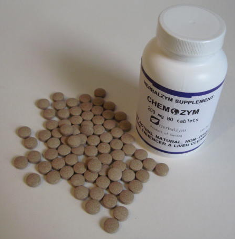 In treating cancer, the life requirements such as Energy, Adaptation, Protection and Reproduction are critically important. Therefore, restoring energy through adaptogens, optimizing internal chemistry via detoxification, supporting the immune system with diet such as Immune Soup and Avocado and inducing apoptosis in cancer stem cells using natural compounds should be considered as promising targets for cancer, whatever type you are facing. Herbal medicine is a great medium with which to do these.
In treating cancer, the life requirements such as Energy, Adaptation, Protection and Reproduction are critically important. Therefore, restoring energy through adaptogens, optimizing internal chemistry via detoxification, supporting the immune system with diet such as Immune Soup and Avocado and inducing apoptosis in cancer stem cells using natural compounds should be considered as promising targets for cancer, whatever type you are facing. Herbal medicine is a great medium with which to do these.
There is no consensus as to whether cancer is a local or systemic disease, but the fact that the tumor is highly toxic suggests the need for blood cleansing and liver detoxification. Toxicity can be caused by chemical irritants, those are ingested, inhaled, or absorbed through the skin; it can also become elevated by die off of the tumor and/or other morbid cells. On emotional level, people may begin by feeling more apathetic and later be irritable and sometimes quite angry. When patients are able to release suppressed toxic emotions (via TeanZym or other means), the optimal scenario is for the patient to work with accompanying practitioners.
With a proper program of detoxification, gains are almost immediate. What health foods should you eat to clean out your blood?
A detoxification soup can be your first step in treating cancer. The therapeutic value of soup comes from the ease with which your body can assimilate the nutrients from the ingredients, which have been broken down by simmering. As a liquid, soup is already helping you flush waste from your body. When you choose detoxifying ingredients, such as the ones featured in the recipe below, you are really treating your body to an internal cleanse.
Simmer the following for 1 hour over a low flame: radish, shitake mushrooms, cabbage, brussels sprouts, cilantro, fennel, garlic clove and onion, a bit of ginger, cauliflower, artichoke, leeks, black or dark brown seaweed, dandelion, mustard greens, turmeric, black beans and black wild rice (soaked for 6 hours and drained) and watercress.
You can take this soup 3 times daily. However, it is always best to serve soups when fresh because each day, the therapeutic value decreases.
The liver is one of the most fascinating organs of the human body. It is responsible for a wide range of activities in the body that include detoxification, playing a role in digestion, hormone production, controlling metabolism, and storage of glycogen after metabolizing fat. To protect the liver from damage, the best effort that you can do is to maintain a healthy diet and protect the liver from an obvious intake of toxins like drugs, which is broken down in the liver. One of the greatest dangers to the liver is actually from formulations that claim to purify the blood. These formulations have been discovered to actually be detrimental to liver function and should be avoided.
 Give your liver a natural lift with the time-tested medicinal herbal agents of ChemoZym, which help enhence physical and mental strength naturally, support the liver. ChemoZym can also be valuable for those suffering from the side effects of chemotherapy. For many years, it has been used most effectively as a liver tonic and as an adaptogen to fight fatigue and counteract the effects of stress on cancer patients. ChemoZym contains an “adaptogenic” mixture of fermented herbal compounds including chemorine and phenolics in a synergistic proprietary formula designed to promote the anti-multidrug resistance (MDR) activities. Chemorine is combined alkaloids extractracted from a member of the magnolia family.
Give your liver a natural lift with the time-tested medicinal herbal agents of ChemoZym, which help enhence physical and mental strength naturally, support the liver. ChemoZym can also be valuable for those suffering from the side effects of chemotherapy. For many years, it has been used most effectively as a liver tonic and as an adaptogen to fight fatigue and counteract the effects of stress on cancer patients. ChemoZym contains an “adaptogenic” mixture of fermented herbal compounds including chemorine and phenolics in a synergistic proprietary formula designed to promote the anti-multidrug resistance (MDR) activities. Chemorine is combined alkaloids extractracted from a member of the magnolia family.
Cancer stem cells may exploit MDR to lower the cellular accumulation of chemo drugs and thereby sustain tumor growth. Natural compounds show great promise as anti-MDR agents, and given the strong link between cancer stem cells and MDR, may reflect the feasibility of targeting cancer stem cells to fight dise. Chemorine is natural agens that target multidrug resistance (MDR). The major mechanism of drug efflux in MDR is carried out by energy-dependent transporter proteins belonging to the ATP-binding cassette (ABC) family. Members of this group of transporter proteins include P-glycoprotein (P-gp), multidrug resistant-associated proteins (MRPs), and mitoxantrone resistance protein (MXR or ABCG2). Although clinical trials have yet to assess the role of natural products against MDR, a variety of natural products interact with ABC transport proteins and reverse the MDR phenotype in vitro.
Chemorine is one of the most potent anti-MDR agents. Combination treatment of chemorine with a variety of chemo drugs enhances the cellular accumulation of these drugs, effectively sensitizing drug-resistant cells. For many years now, ChemoZym has been used with great success on many terminally ill patients. Curcumin and EGCG have anti-MDR activity too. Study shows that curcumin decreased expression of mdr1b, mediated by PI3K, Akt, and NF-κB pathways. Curcumin also inhibited the activity of the transporter ABCG2. Addition of curcumin reversed MDR in ABCG2-expressing HEK cells and facilitated the accumulation of doxorubicin and mitoxantrone in cells, thereby increasing the cells sensitivity to the chemo drugs.
Mechanisms of multidrug resistance in cancer.
Enhanced MDR1 expression and chemoresistance of cancer stem cells derived from glioblastoma.
Tumour stem cells and drug resistance.
A tumorigenic subpopulation with stem cell properties in melanomas.
Expression of multidrug resistance genes in normal and cancer stem cells.
Persistence of side population cells with high drug efflux capacity in pancreatic cancer.
NF-kappaB pathway inhibitors preferentially inhibit breast cancer stem-like cells.
Analysis of gene expression and chemoresistance of CD133+ cancer stem cells in glioblastoma.
Reversal of cancer multidrug resistance by tea polyphenol in KB cells.
Inhibition of the multidrug resistance P-glycoprotein activity by green tea polyphenols.